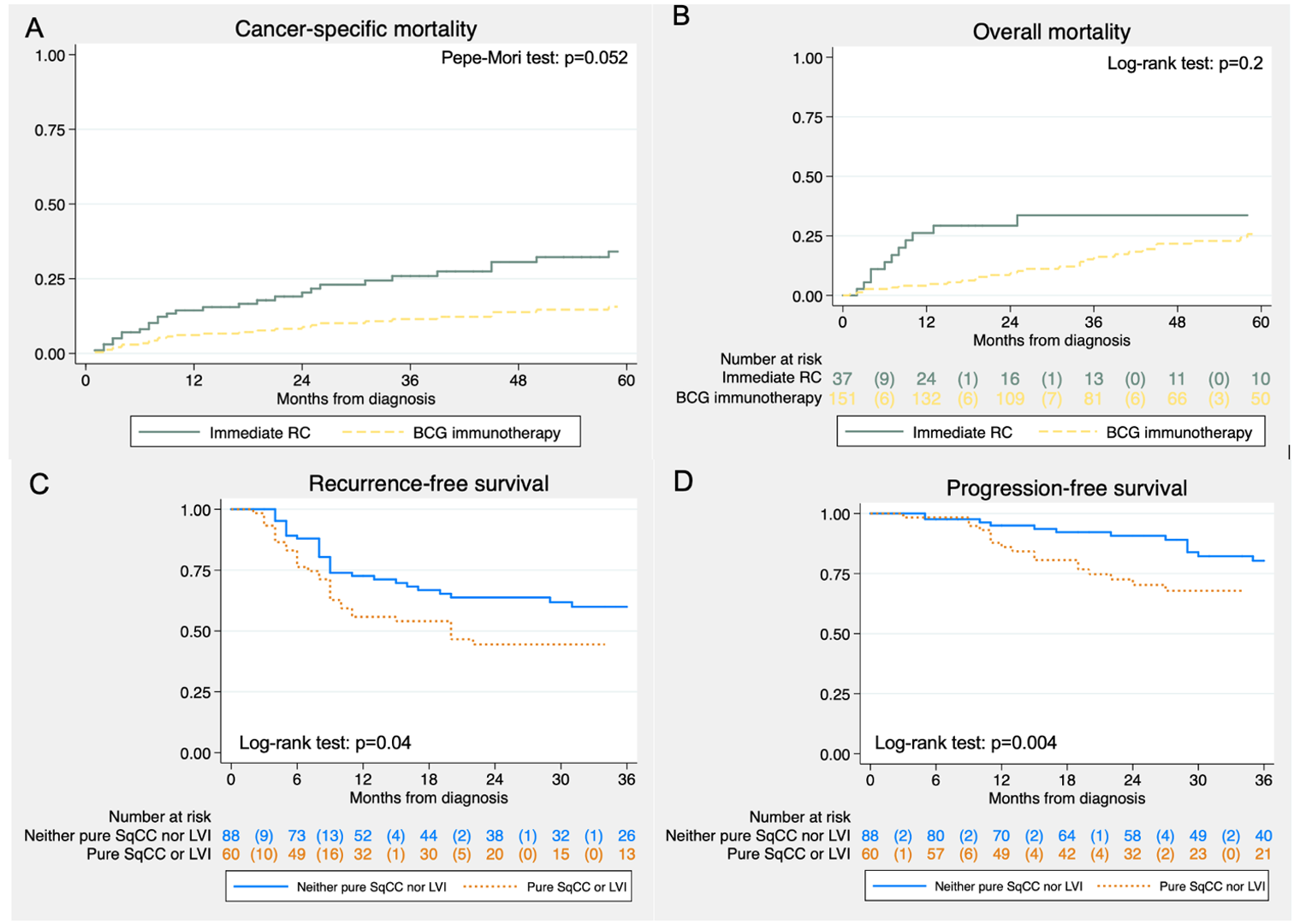Back
Poster, Podium & Video Sessions
Moderated Poster
MP54: Bladder Cancer: Non-invasive II
MP54-16: Immediate Radical Cystectomy vs. BCG Immunotherapy for T1 High Grade Non-Muscle-Invasive Bladder Cancer: an International Multicentre Collaboration
Monday, May 16, 2022
8:45 AM – 10:00 AM
Location: Room 228
Chiara Lonati*, Brescia, Italy, Luca Afferi, Lucerne, Switzerland, Andrea Mari, Andrea Minervini, Florence, Italy, Wojciech Krajewski, Wroclaw, Poland, Marco Borghesi, Genova, Italy, Gerald B. Schulz, Munich, Germany, Michael Rink, Hamburg, Germany, Francesco Montorsi, Alberto Briganti, Alberto Martini, Milan, Italy, Stefania Zamboni, Claudio Simeone, Brescia, Italy, Francesco Soria, Turin, Italy, Jeremy Y.C. Teoh, Hong Kong, China, People's Republic of, Mathieu Roumiguié, Toulouse, France, Morgan Roupret, Paris, France, M. Carmen Mir, Valencia, Spain, Alessandro Antonelli, Verona, Italy, Kees Hendricksen, Amsterdam, Netherlands, Roberto Carando, Christian D. Fankhauser, Philipp Baumeister, Agostino Mattei, Lucerne, Switzerland, Shahrokh F. Shariat, Vienna, Austria, Marco Moschini, Milan, Italy

Chiara Lonati, MD
Spedali Civili of Brescia
Poster Presenter(s)
Introduction: To compare cancer-specific mortality (CSM) and overall mortality (OM) between immediate radical cystectomy (RC) and conservative management with Bacillus Calmette-Guérin (BCG) immunotherapy for T1 squamous bladder cancer (BCa).
Methods: We retrospectively analysed 188 T1 high-grade squamous BCa patients treated between 1998 and 2019 at fifteen tertiary referral centres. Median follow-up time was 36 months (interquartile range: 19-76). The cumulative incidence and Kaplan-Meier curves were applied for CSM and OM, respectively, and compared with the Pepe-Mori and log-rank tests. Multivariable Cox models, adjusted for pathological findings at initial transurethral resection of bladder (TURB) specimen, were adopted to predict tumour recurrence and tumour progression after BCG immunotherapy.
Results: Immediate RC and conservative management were performed in 20% and 80% of patients, respectively. Five-year CSM and OM did not significantly differ between the two therapeutic strategies (Pepe-Mori test p=0.052 and log-rank test p=0.2, Fig. 1A and 1B respectively). Among conservatively-treated patients, tumour recurrence was observed in 41% of individuals (median time: 8 months), while tumour progression was reported in 24% of patients (median time: 19 months). At multivariable Cox analyses, pure squamous cell carcinoma (SqCC) was an independent predictor of tumour progression (hazard ratio [HR]: 2.40; p=0.04), while concomitant lymphovascular invasion (LVI) was an independent predictor of both tumour recurrence and progression after BCG immunotherapy (HR: 1.94; p=0.04 and HR: 2.19; p=0.04, respectively). Patients with neither pure SqCC nor LVI showed a significant benefit in three-year recurrence-free survival and progression-free survival compared to individuals with pure SqCC or LVI (60% vs. 44%; log-rank p=0.04 and 80% vs. 68%; log-rank p=0.004, Fig. 1C and 1D respectively).
Conclusions: BCG could represent an effective treatment for T1 squamous BCa patients with neither pure SqCC nor LVI, while immediate RC should be preferred among T1 squamous BCa patients with pure SqCC or LVI at initial TURB specimen.
Source of Funding: None.

Methods: We retrospectively analysed 188 T1 high-grade squamous BCa patients treated between 1998 and 2019 at fifteen tertiary referral centres. Median follow-up time was 36 months (interquartile range: 19-76). The cumulative incidence and Kaplan-Meier curves were applied for CSM and OM, respectively, and compared with the Pepe-Mori and log-rank tests. Multivariable Cox models, adjusted for pathological findings at initial transurethral resection of bladder (TURB) specimen, were adopted to predict tumour recurrence and tumour progression after BCG immunotherapy.
Results: Immediate RC and conservative management were performed in 20% and 80% of patients, respectively. Five-year CSM and OM did not significantly differ between the two therapeutic strategies (Pepe-Mori test p=0.052 and log-rank test p=0.2, Fig. 1A and 1B respectively). Among conservatively-treated patients, tumour recurrence was observed in 41% of individuals (median time: 8 months), while tumour progression was reported in 24% of patients (median time: 19 months). At multivariable Cox analyses, pure squamous cell carcinoma (SqCC) was an independent predictor of tumour progression (hazard ratio [HR]: 2.40; p=0.04), while concomitant lymphovascular invasion (LVI) was an independent predictor of both tumour recurrence and progression after BCG immunotherapy (HR: 1.94; p=0.04 and HR: 2.19; p=0.04, respectively). Patients with neither pure SqCC nor LVI showed a significant benefit in three-year recurrence-free survival and progression-free survival compared to individuals with pure SqCC or LVI (60% vs. 44%; log-rank p=0.04 and 80% vs. 68%; log-rank p=0.004, Fig. 1C and 1D respectively).
Conclusions: BCG could represent an effective treatment for T1 squamous BCa patients with neither pure SqCC nor LVI, while immediate RC should be preferred among T1 squamous BCa patients with pure SqCC or LVI at initial TURB specimen.
Source of Funding: None.


.jpg)
.jpg)